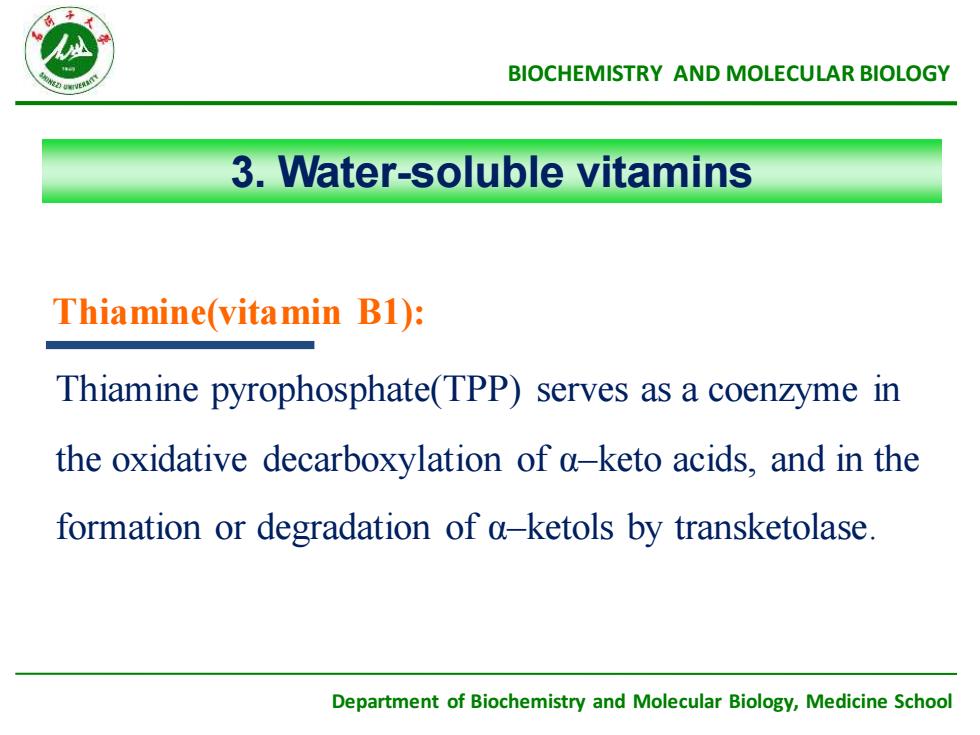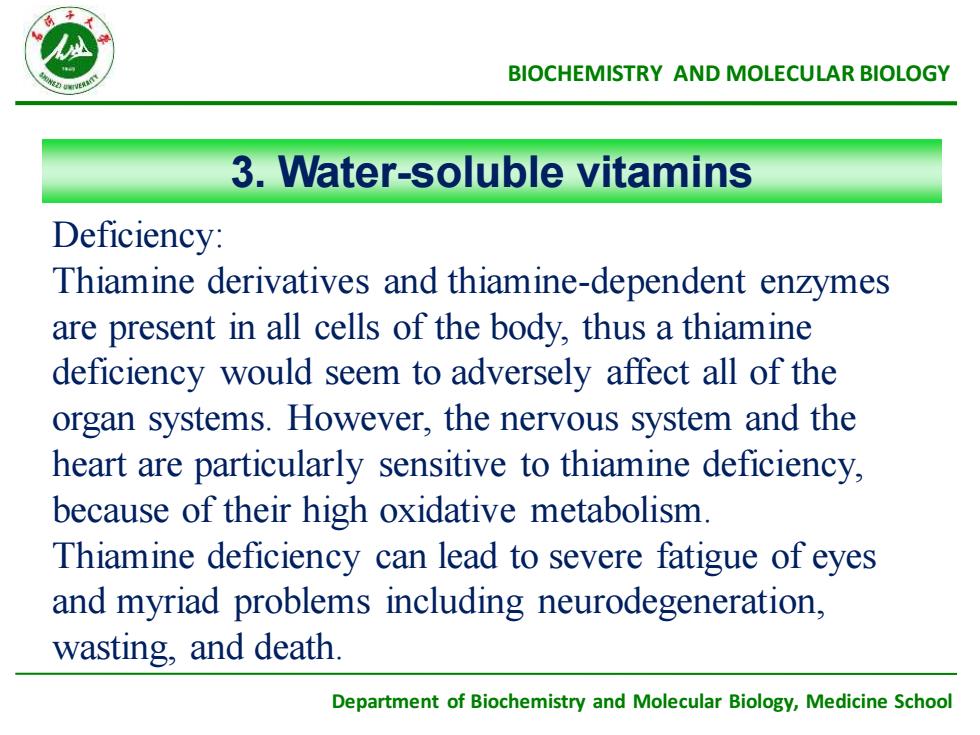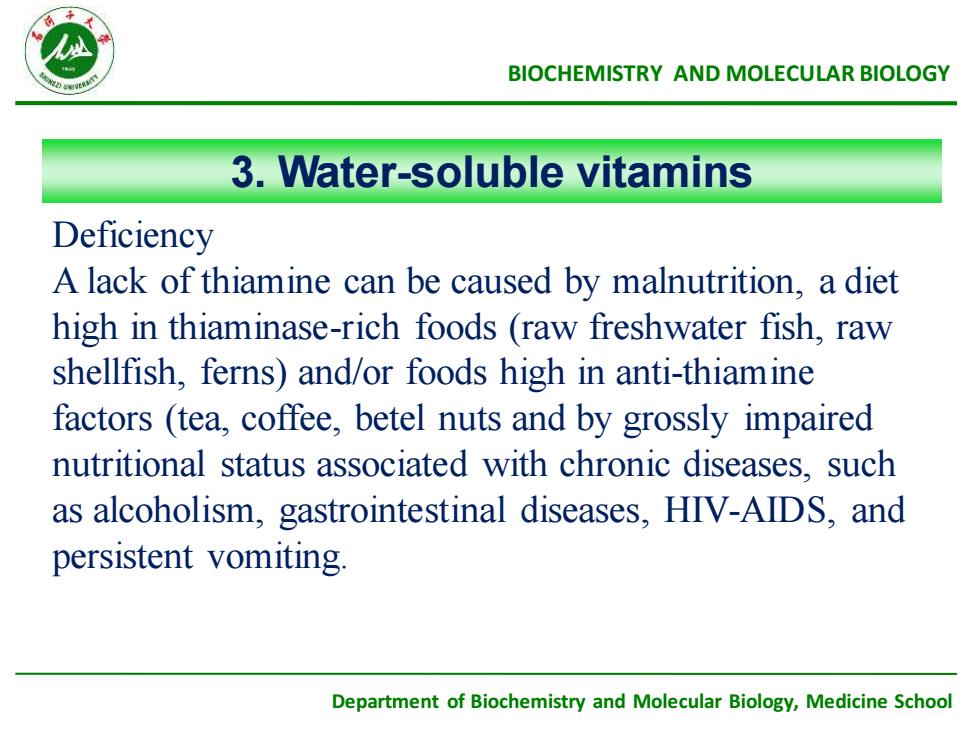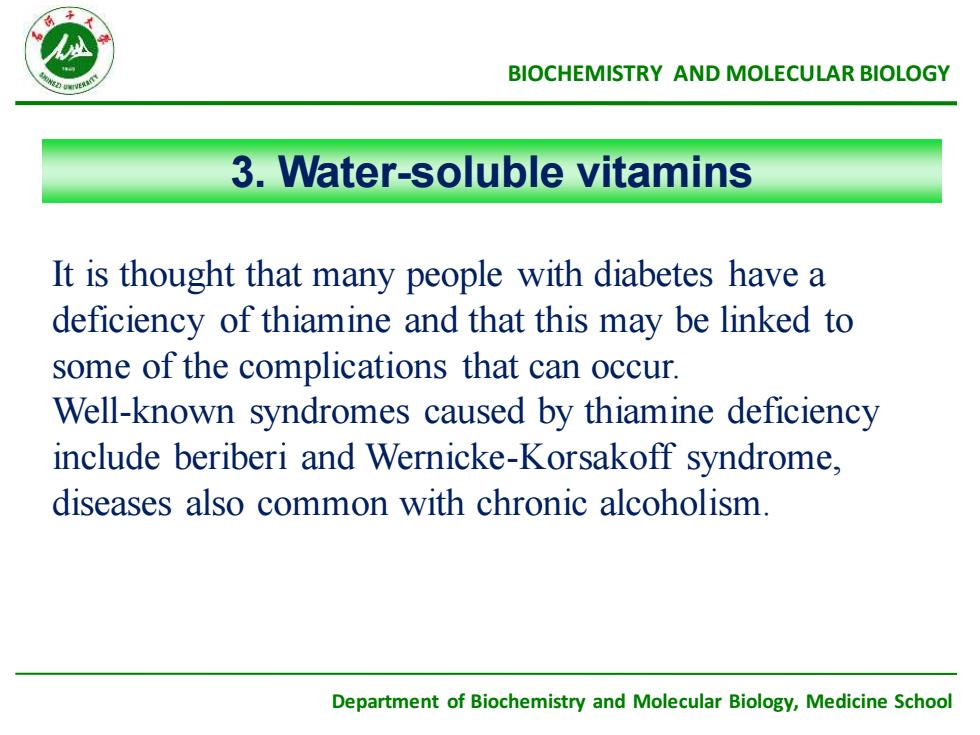
BIOCHEMISTRYANDMOLECULARBIOLOGY2.VitaminsupplementsTraditional role of vitamin supplements:In the past, supplementation of the diet with vitamins wasreserved for patients at risk for nutritional deficiencies>Vitamin supplementation in the general populationVitamin supplementation is slowly but inexorably makingatransition from being a fad regimen to becomingrespectable therapyDepartment of Biochemistry and Molecular Biology,Medicine School
Department of Biochemistry and Molecular Biology, Medicine School BIOCHEMISTRY AND MOLECULAR BIOLOGY 2. Vitamin supplements ➢Traditional role of vitamin supplements: In the past, supplementation of the diet with vitamins was reserved for patients at risk for nutritional deficiencies. ➢Vitamin supplementation in the general population: Vitamin supplementation is slowly but inexorably making a transition from being a fad regimen to becoming respectable therapy

BIOCHEMISTRYANDMOLECULARBIOLOGY3.Water-solublevitaminsThiamine(vitamin Bl):Thiamine pyrophosphate(TPP) serves as a coenzyme inthe oxidative decarboxylation of α-keto acids, and in theformation or degradation of α-ketols by transketolaseDepartment of Biochemistry and Molecular Biology,Medicine School
Department of Biochemistry and Molecular Biology, Medicine School BIOCHEMISTRY AND MOLECULAR BIOLOGY 3. Water-soluble vitamins Thiamine pyrophosphate(TPP) serves as a coenzyme in the oxidative decarboxylation of α–keto acids, and in the formation or degradation of α–ketols by transketolase. Thiamine(vitamin B1):

BIOCHEMISTRYANDMOLECULARBIOLOGY3.Water-soluble vitaminsDeficiency:Thiamine derivatives and thiamine-dependent enzymesare present in all cells of the body, thus a thiaminedeficiency would seem to adversely affect all of theorgan systems. However, the nervous system and theheart are particularly sensitive to thiamine deficiency,because of their high oxidative metabolism.Thiamine deficiency can lead to severe fatigue of eyesand myriad problems including neurodegeneration,wasting, and deathDepartment of Biochemistry and Molecular Biology,MedicineSchool
Department of Biochemistry and Molecular Biology, Medicine School BIOCHEMISTRY AND MOLECULAR BIOLOGY 3. Water-soluble vitamins Deficiency: Thiamine derivatives and thiamine-dependent enzymes are present in all cells of the body, thus a thiamine deficiency would seem to adversely affect all of the organ systems. However, the nervous system and the heart are particularly sensitive to thiamine deficiency, because of their high oxidative metabolism. Thiamine deficiency can lead to severe fatigue of eyes and myriad problems including neurodegeneration, wasting, and death

BIOCHEMISTRYANDMOLECULARBIOLOGY3.Water-solublevitaminsDeficiencyA lack of thiamine can be caused by malnutrition, a diethigh in thiaminase-rich foods (raw freshwater fish, rawshellfish,ferns)and/or foodshigh in anti-thiaminefactors (tea, coffee, betel nuts and by grossly impairednutritional status associated with chronic diseases, suchas alcoholism, gastrointestinal diseases, HIV-AIDS, andpersistent vomitingDepartment of Biochemistry and Molecular Biology,Medicine School
Department of Biochemistry and Molecular Biology, Medicine School BIOCHEMISTRY AND MOLECULAR BIOLOGY 3. Water-soluble vitamins Deficiency A lack of thiamine can be caused by malnutrition, a diet high in thiaminase-rich foods (raw freshwater fish, raw shellfish, ferns) and/or foods high in anti-thiamine factors (tea, coffee, betel nuts and by grossly impaired nutritional status associated with chronic diseases, such as alcoholism, gastrointestinal diseases, HIV-AIDS, and persistent vomiting

BIOCHEMISTRYANDMOLECULARBIOLOGY3.Water-soluble vitaminsIt is thought that many people with diabetes have adeficiency of thiamine and that this may be linked tosome of the complications that can occur.Well-known syndromes caused by thiamine deficiencyinclude beriberi and Wernicke-Korsakoff syndrome.diseases also common with chronic alcoholismDepartment of Biochemistry and Molecular Biology,Medicine School
Department of Biochemistry and Molecular Biology, Medicine School BIOCHEMISTRY AND MOLECULAR BIOLOGY 3. Water-soluble vitamins It is thought that many people with diabetes have a deficiency of thiamine and that this may be linked to some of the complications that can occur. Well-known syndromes caused by thiamine deficiency include beriberi and Wernicke-Korsakoff syndrome, diseases also common with chronic alcoholism